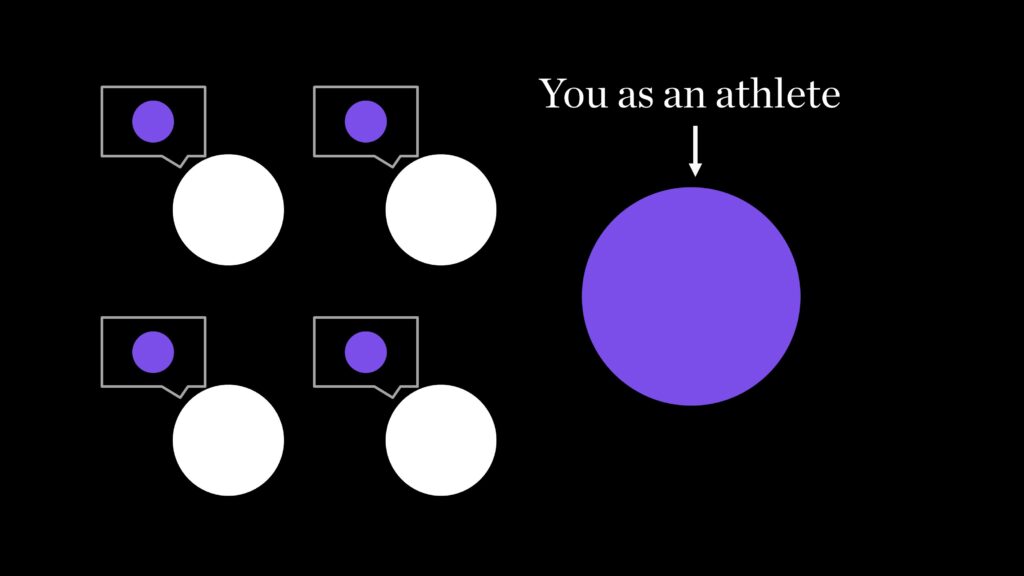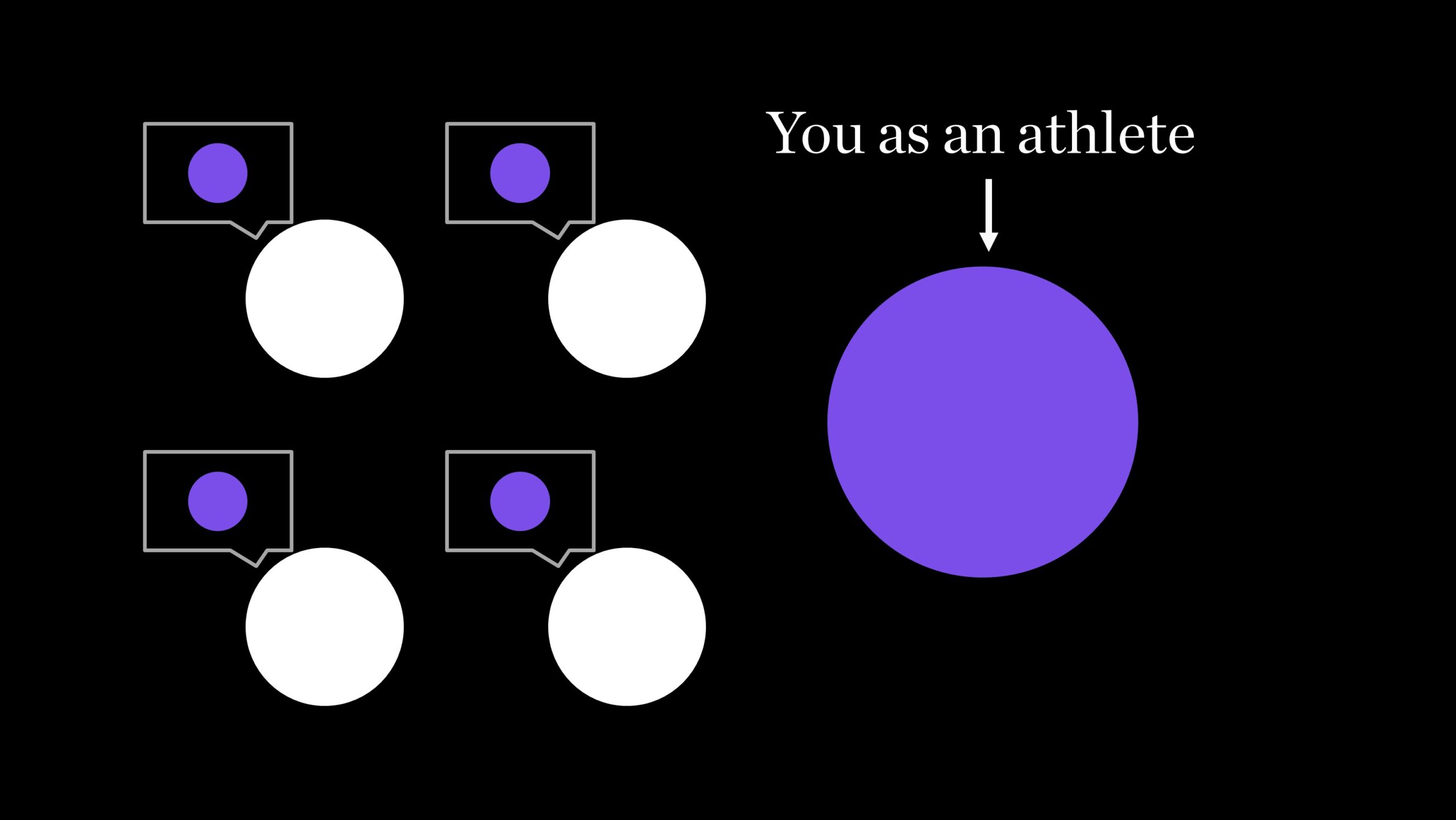Article last updated on January 4, 2023
Athletes who want to make a name for themselves and have a successful career can use athlete branding to do both.
Building a recognizable brand can help athletes enhance their presence in the sports industry, gain visibility, and earn more revenue.

In this article, we’ll discuss the essential elements of athlete branding, why it’s important, and how athletes can go about establishing and nurturing their brand.
Benefits of a Successful Athlete Brand
Athletes who create a successful brand can take on many opportunities that come from having a recognizable identity. Here are some of the benefits of having a successful athlete brand:
- Increased visibility – A successful brand can help you stand out in the crowded sports industry and gain more recognition.
- More marketing opportunities – With an established brand, you’ll have more opportunities to increase your visibility, such as sponsorships, endorsements, and media coverage.
- Greater earning potential – When your brand has a strong presence, it can lead to increased revenue from endorsements, sponsorships, and other opportunities.
- Improved fan experience – Establishing a strong brand can also help improve your fan experience. With a strong brand, you can create more meaningful relationships with fans and increase their loyalty.
- Better career opportunities – A successful brand can also help you open doors to better career opportunities, such as coaching and broadcasting.
The importance of defining your personal brand as an athlete
Personal branding is an essential part of athlete branding. It helps you define and articulate who you are and showcase your values, beliefs, and personality.
It’s important to define your personal brand as an athlete because it allows you to stand out from other athletes in the industry and distinguish yourself from the competition. It also helps you create a strong, recognizable identity that resonates with fans.
The role of social media in athlete branding

Social media is an effective platform to reach out to your fans, build relationships, and share content. It also provides an avenue to show your personality, promote your achievements, and connect with potential sponsors and partners. When done right, social media can help you reach larger audiences and boost your visibility.
This is a big part of building your brand as an athlete because it helps you stand out and connect with your fans.
Just take a look at some of the biggest athletes in the world, such as LeBron James and Cristiano Ronaldo. They have millions of followers on social media, which helps them build their brand and reach out to a larger audience.
The ways athletes are promoting themselves
Athletes today are using a variety of marketing strategies to promote themselves and build their brands. Here are some of the most popular tactics athletes are using:
- Social media – Many athletes are using Instagram, Twitter, and other social media platforms to promote themselves, share content, and interact with their fans.
- Influencer marketing – Many athletes are partnering with influencers to reach larger audiences and promote their brand.
- Content marketing – Athletes are creating different types of content, such as videos and blog posts, to reach their audiences and showcase their personalities.
- Brand partnerships – By partnering with other brands, athletes can increase their reach and gain more visibility.
- Appearances – Many athletes are attending events and engaging with their fans to build relationships and promote their brand.
These are just some of the ways athletes are promoting themselves and building their brands. As an athlete, it’s important to find the right mix of strategies that work for you and your brand.
How to Build an Effective Athlete Brand

As mentioned above, building an effective athlete brand is key to success in the sports industry. Here are some tips for establishing and nurturing your brand:
- Define your brand – Think about what makes you unique, what you stand for, and how you want to be perceived by your fans and the wider industry.
- Research your competition – Researching what others are doing and how they’re communicating with their fans can help you establish a unique and effective brand.
- Identify your target audience – Identifying the people who are likely to be interested in your brand will help you tailor your messaging and reach the right people.
- Develop a voice – Developing a consistent voice on social media and other channels can help you build relationships and demonstrate your personality.
- Create content – Creating content that resonates with your target audience can help you build an engaged and loyal fan base.
- Leverage endorsements and sponsorships – Leveraging sponsorships and endorsements can help you gain more visibility
Now that you’re aware of this, let’s delve deeper and look at how to create an effective athlete brand.
Identify your unique value proposition as an athlete
Your unique value proposition as an athlete is the reason why fans should gravitate towards you and your brand.
It’s your unique qualities that make you stand out from other athletes and the overall sports industry. To identify your unique value proposition, ask yourself the following questions:
- What qualifications, skills, and achievements make me different from other athletes?
- What unique qualities do I bring to the table?
- How do I differentiate myself from the competition?
Once you know what your unique value proposition is, you can start writing your messaging and building your brand identity.
Develop a consistent visual aesthetic for your brand
The visuals you use to represent your brand will be an important part of your identity.
Whether it’s a specific way you dress, the colors you use, or the type of photography you use for your social media posts, it’s important to develop a consistent visual aesthetic that resonates with your target audience.
There needs to be consistency.
Consistency is key when it comes to athlete branding. While it’s important to experiment and evolve your brand, you should ensure that your messaging and visuals are consistent across all channels and platforms.
This will help you build a name for yourself and make you more visible in the sports industry.
Be authentic and share your story

Authenticity is essential when it comes to athlete branding. Your story is unique and should be shared with your fans in an honest and engaging way.
Telling your story can help you connect with your fans on a deeper level and show how much you love the sport.
These are just some of the tips for successful athlete branding. Establishing and nurturing a strong brand takes time and effort, but it’s a necessary step for any athlete who wants to stand out and make an impact in the sports industry.
Engage with your audience on social media
Interacting with your fans on social media is an important part of athlete branding. It helps to demonstrate your personality, create emotional connections, and increase your visibility.
Make sure to interact with your fans regularly, respond to comments, post engaging content, and take part in meaningful conversations. It’s also important to stay up-to-date with the latest trends and industry news so you can join the conversation.
Maintaining and Growing Your Athlete Brand
Maintaining a strong athlete brand involves more than just creating content and engaging with fans. To keep your brand successful and up-to-date, you need to keep an eye on it and change it over time.
Make sure to review your metrics, measure your performance, and use the data to inform your decisions. This will help you stay ahead of the curve and ensure your brand is performing at its best.
Stay true to your values and goals as an athlete
At the end of the day, your brand should reflect your values and goals as an athlete. Focus on what makes you unique, understand your audience, and maintain a consistent brand image. This will assist you in distinguishing yourself from the competition and developing a successful athlete brand.
What’s more, it’s important to have patience and perseverance when it comes to building your brand.
Growing an athlete brand takes time and effort, but with the right approach, you can make sure your brand is successful for many years to come.
Collaborate with relevant brands and organizations

One of the best ways to grow your athlete brand is to collaborate with relevant brands and organizations.
Sponsorships, product endorsements, and event appearances are great ways to increase your visibility and gain more exposure for your brand.
These collaborations also provide you with valuable resources and help you build relationships with brands and organizations that share your values and goals.
Partnering with other brands can also give you more chances to show off your brand to more people.
Continuously adapt and evolve your brand to stay relevant in the sports industry
As an athlete, it’s important for your brand to show that the sports world is always changing and growing.
Pay attention to trends, stay up-to-date with the latest industry news, and be open to experimenting and trying new things. This will help you stay ahead of the curve and remain relevant in the sports industry.
You could pay attention to:
- Trends in athlete brands and the sports industry
- Latest technology, data, and analytics
- Changes in the media and sports culture
- Opportunities to collaborate with other brands and organizations
- Ways to stand out through content and visuals
Now that you understand what athletic branding is and how to create a successful athlete brand, you may be wondering about the future of athletic branding. So that’s the final thing that we will cover.
What the Future Holds for Athletes and Athlete Branding
Athlete branding is only going to become more important in the years to come. Social media and technology are evolving rapidly, and athletes need to keep up with these developments in order to stay competitive.
Data and analytics will continue to be important in the industry, with teams and sponsors relying more and more on metrics to measure performance and evaluate investments.
Visuals and storytelling will also remain vital, as fans increasingly expect to see athletes as more than just athletes, but as personalities and role models.
The increasing importance of athlete branding in the sports industry
As the competition for fans and sponsors intensifies, athlete branding is going to become ever more important in the sports industry.
It’s no longer enough for athletes to just be talented and successful; they also need to be able to engage with their fans, build meaningful relationships, and develop a recognizable identity that resonates with their audience.
In the years to come, athletes will need to focus on more than just their performance on the field, but also on establishing an engaging and successful brand.
The potential for athlete brands to transcend sports and enter into other industries

With increasing media coverage, sponsorships, and partnerships, athletes can use their brands to make a bigger impact outside of sports.
This could include branching out into other industries, such as fashion, technology, and entertainment, and leveraging their brand to promote causes and campaigns that are close to their hearts.
All of us have seen:
- LeBron James collaborating with Nike, producing his own clothing line
- Novak Djokovic creating a foundation to help disadvantaged children in Serbia
- Steph Curry featuring in a recent commercial for Under Armour
This is just the beginning of what could be possible for the future of athlete branding. As athletes become more savvy about how to establish and promote their personal brands, more opportunities will open up for them to make an even bigger impact in the sports industry and beyond.
Frequently Asked Questions
If you have read the entire article and still have some questions, perhaps the FAQs below will help you out. Here are some questions about athlete branding:
What are the potential drawbacks and risks of building a personal brand as an athlete?
Some potential drawbacks of building a personal brand as an athlete include the potential for negative press, criticism, and pressure from sponsors. Additionally, athletes need to make sure that their brand is consistent and authentic to avoid alienating their fans and sponsors.
What role do sports agents play in athlete branding and marketing?
Sports agents are often responsible for helping athletes create, manage, and promote their personal brands. This can include helping to develop content, crafting messages and campaigns, and negotiating and securing endorsements and sponsorships.
How can athletes adapt their brand as they move through different stages of their career?
As athletes move through different stages of their careers, it’s important that they adapt their brand to stay relevant and attractive to sponsors. This can include making sure they are staying up-to-date with the latest trends, experimenting with different content, and looking for unique ways to engage with their fans and sponsors.
How can athletes measure the success and impact of their personal brand?
Athletes can measure the success and impact of their personal brand by looking at metrics like followers and engagement on social media, impressions from sponsored posts, sales figures from product endorsements, and attendance and viewership numbers at events or matches.
Conclusion
In conclusion, athlete branding is a powerful tool for athletes to carve out an identity and stand out in the sports industry.
It requires dedication, focus, and strategic planning, but with the right approach, any athlete can start building an impactful and successful brand.
Athletes can use their brand to make a lasting impact in the industry and beyond if they keep up with the latest trends, work with relevant brands and organizations, and adapt to the changing landscape of the industry.
Now that you understand athlete branding and the key steps towards building a successful brand, it’s time to get to work! Good luck!


